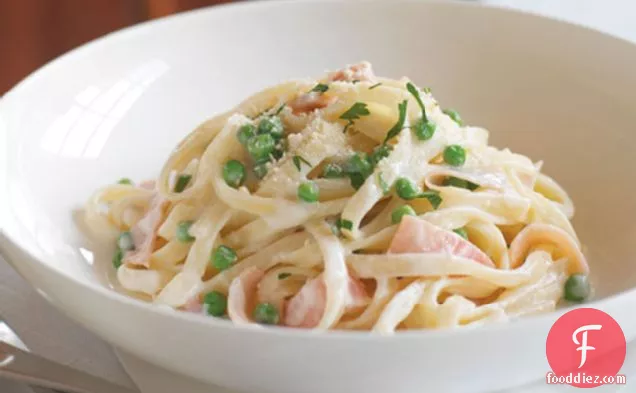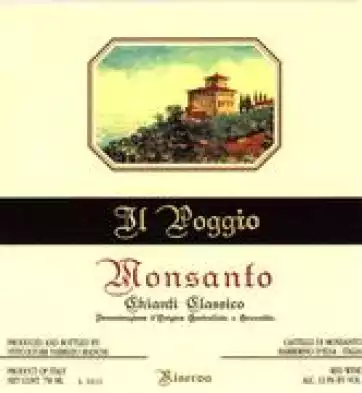Updated Fettuccine Carbonara

Updated Fettuccine Carbonara might be just the side dish you are searching for. This recipe serves 25. One portion of this dish contains about 4g of protein, 3g of fat, and a total of 81 calories. From preparation to the plate, this recipe takes approximately 25 minutes. This recipe is typical of Mediterranean cuisine. If you have peas, oscar mayer ham, flour, and a few other ingredients on hand, you can make it.
Instructions
1
Cook pasta in large saucepan as directed on package, adding peas to the boiling water for the last 3 min.
Ingredients you will need![Pasta]() Pasta
Pasta![Water]() Water
Water![Peas]() Peas
Peas
Equipment you will use![Sauce Pan]() Sauce Pan
Sauce Pan
2
Meanwhile, beat cream cheese, dressing and flour in medium saucepan with whisk until well blended. Gradually add milk, stirring constantly until mixture is well blended.
Ingredients you will need![Cream Cheese]() Cream Cheese
Cream Cheese![All Purpose Flour]() All Purpose Flour
All Purpose Flour![Milk]() Milk
Milk
Equipment you will use![Sauce Pan]() Sauce Pan
Sauce Pan![Whisk]() Whisk
Whisk
Ingredients
59milliliters![KRAFT Lite Creamy Caesar Dressing]() KRAFT Lite Creamy Caesar Dressing237milliliters
KRAFT Lite Creamy Caesar Dressing237milliliters![fat-free milk]() fat-free milk227grams
fat-free milk227grams![fettuccine, uncooked]() fettuccine, uncooked1Tbsp
fettuccine, uncooked1Tbsp![flour]() flour59milliliters
flour59milliliters![chopped fresh parsley]() chopped fresh parsley170grams
chopped fresh parsley170grams![pkg. OSCAR MAYER Smoked Ham, cut into short strips]() pkg. OSCAR MAYER Smoked Ham, cut into short strips3Tbsps
pkg. OSCAR MAYER Smoked Ham, cut into short strips3Tbsps![KRAFT Grated Parmesan Cheese]() KRAFT Grated Parmesan Cheese237milliliters
KRAFT Grated Parmesan Cheese237milliliters![frozen peas]() frozen peas59milliliters
frozen peas59milliliters![PHILADELPHIA 1/3 Less Fat than Cream Cheese]() PHILADELPHIA 1/3 Less Fat than Cream Cheese
PHILADELPHIA 1/3 Less Fat than Cream Cheese
 KRAFT Lite Creamy Caesar Dressing237milliliters
KRAFT Lite Creamy Caesar Dressing237milliliters fat-free milk227grams
fat-free milk227grams fettuccine, uncooked1Tbsp
fettuccine, uncooked1Tbsp flour59milliliters
flour59milliliters chopped fresh parsley170grams
chopped fresh parsley170grams pkg. OSCAR MAYER Smoked Ham, cut into short strips3Tbsps
pkg. OSCAR MAYER Smoked Ham, cut into short strips3Tbsps KRAFT Grated Parmesan Cheese237milliliters
KRAFT Grated Parmesan Cheese237milliliters frozen peas59milliliters
frozen peas59milliliters PHILADELPHIA 1/3 Less Fat than Cream Cheese
PHILADELPHIA 1/3 Less Fat than Cream CheeseRecommended wine: Chianti, Trebbiano, Verdicchio
Italian on the menu? Try pairing with Chianti, Trebbiano, and Verdicchio. Italians know food and they know wine. Trebbiano and Verdicchio are Italian white wines that pair well with fish and white meat, while Chianti is a great Italian red for heavier, bolder dishes. You could try Castello di Monsanto Il Poggio Chianti Classico Riserva. Reviewers quite like it with a 4.8 out of 5 star rating and a price of about 40 dollars per bottle.

Castello di Monsanto Il Poggio Chianti Classico Riserva
Born in the vineyard “Il Poggio” (5.5 Ha, 310 metres a.s.l.) from which in 1962, it took its name: it is the first Chianti Classico Cru. Made of 90% Sangiovese and from 7% Canaiolo and 3% Colorino, it ages for 20 months in French oak barrels. Today it represents the most prestigious product of the company, appreciated all over the world. It is produced only in the best vintages. The company has chosen to keep a considerable quantity of bottles of this wine in the cellar being the permanent archives, able to tell the history of Castello di MonsantoDifficultyHard
Ready In25 m.
Servings25
Health Score1
Magazine

Your Inner Chef with Taylor Swift's Top 3 Recipes from Her Beloved NYC Hangout

20 Mouthwatering Recipes You Need to Try Today!

Master the Art of Making Perfect Pancakes with This Foolproof Recipe

The Science Behind Red Wine: Its Surprising Health Benefits and Potential Risks

12 Wine Cocktails for a Sophisticated Twist

Sip, Swirl, and Celebrate: Toasting to National Wine Day on May 25th

National Drink Wine Day on February 18

Celebrating Souffle Day with Delectable Delights

Indulge in the Delightful Flavor of Oyster Soup on Its Special Day!

Celebrating World Nutella Day

18 Meals to Make When You Don't Feel Like Cooking

17 No-Fuss Ideas For When You Dont Know What to Make For Dinner

15 Simple Dinner Ideas for Healthy Eating in Real Life

15 Winter Vegetables That Are Seriously Good for You

Traditional South American Foods

Traditional Scandinavian foods

Traditional Middle Eastern Foods

Traditional Mediterranean foods

Seasonal January Foods and What to Cook with Them

Fruits to Eat in January

Your Inner Chef with Taylor Swift's Top 3 Recipes from Her Beloved NYC Hangout

The Science Behind Red Wine: Its Surprising Health Benefits and Potential Risks

Celebrating World Nutella Day

Celebrate National Pizza Day on February 9th with Mouthwatering Slices and Fun Facts

Stay Cozy and Warm with These Delicious Winter Recipes

Indiana's Exciting Addition to the Summer Food Program for School Children

10 Must-Try Airport and Train Station Restaurants

Exploring 20 Global Comfort Dishes to Soothe Your Sickness

9 Must-Try Summer Menu Items Taking the Global Food Scene by Storm



